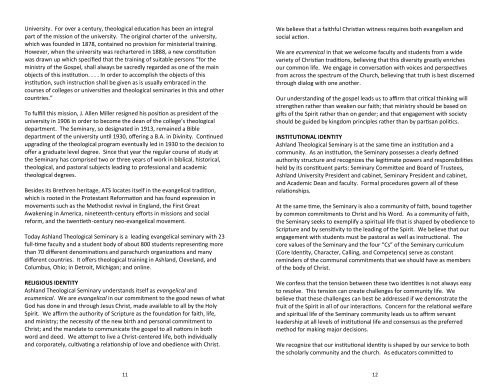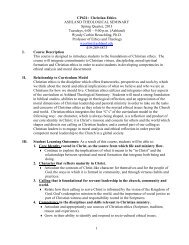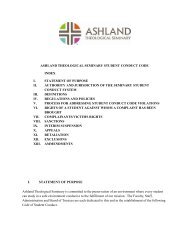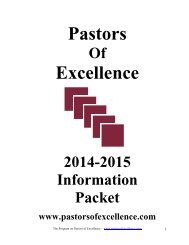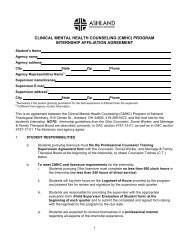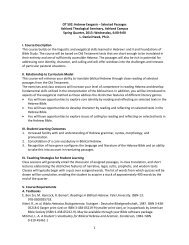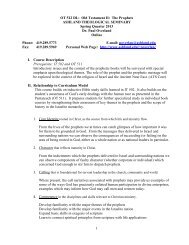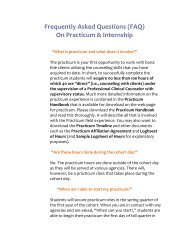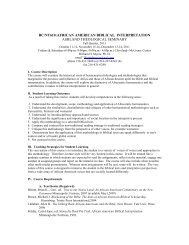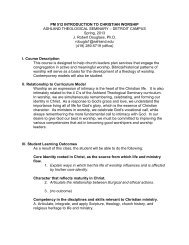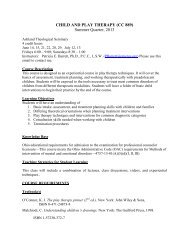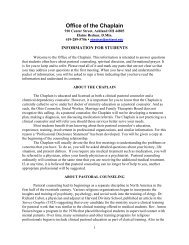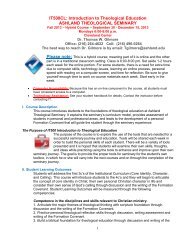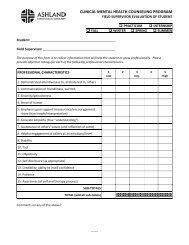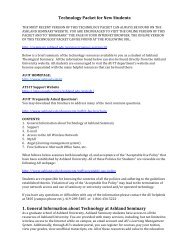Download - Ashland Theological Seminary - Ashland University
Download - Ashland Theological Seminary - Ashland University
Download - Ashland Theological Seminary - Ashland University
Create successful ePaper yourself
Turn your PDF publications into a flip-book with our unique Google optimized e-Paper software.
<strong>University</strong>. For over a century, theological education has been an integral<br />
part of the mission of the university. The original charter of the university,<br />
which was founded in 1878, contained no provision for ministerial training.<br />
However, when the university was rechartered in 1888, a new constitution<br />
was drawn up which specified that the training of suitable persons “for the<br />
ministry of the Gospel, shall always be sacredly regarded as one of the main<br />
objects of this institution. . . . In order to accomplish the objects of this<br />
institution, such instruction shall be given as is usually embraced in the<br />
courses of colleges or universities and theological seminaries in this and other<br />
countries.”<br />
To fulfill this mission, J. Allen Miller resigned his position as president of the<br />
university in 1906 in order to become the dean of the college’s theological<br />
department. The <strong>Seminary</strong>, so designated in 1913, remained a Bible<br />
department of the university until 1930, offering a B.A. in Divinity. Continued<br />
upgrading of the theological program eventually led in 1930 to the decision to<br />
offer a graduate level degree. Since that year the regular course of study at<br />
the <strong>Seminary</strong> has comprised two or three years of work in biblical, historical,<br />
theological, and pastoral subjects leading to professional and academic<br />
theological degrees.<br />
Besides its Brethren heritage, ATS locates itself in the evangelical tradition,<br />
which is rooted in the Protestant Reformation and has found expression in<br />
movements such as the Methodist revival in England, the First Great<br />
Awakening in America, nineteenth-century efforts in missions and social<br />
reform, and the twentieth-century neo-evangelical movement.<br />
Today <strong>Ashland</strong> <strong>Theological</strong> <strong>Seminary</strong> is a leading evangelical seminary with 23<br />
full-time faculty and a student body of about 800 students representing more<br />
than 70 different denominations and parachurch organizations and many<br />
different countries. It offers theological training in <strong>Ashland</strong>, Cleveland, and<br />
Columbus, Ohio; in Detroit, Michigan; and online.<br />
RELIGIOUS IDENTITY<br />
<strong>Ashland</strong> <strong>Theological</strong> <strong>Seminary</strong> understands itself as evangelical and<br />
ecumenical. We are evangelical in our commitment to the good news of what<br />
God has done in and through Jesus Christ, made available to all by the Holy<br />
Spirit. We affirm the authority of Scripture as the foundation for faith, life,<br />
and ministry; the necessity of the new birth and personal commitment to<br />
Christ; and the mandate to communicate the gospel to all nations in both<br />
word and deed. We attempt to live a Christ-centered life, both individually<br />
and corporately, cultivating a relationship of love and obedience with Christ.<br />
We believe that a faithful Christian witness requires both evangelism and<br />
social action.<br />
We are ecumenical in that we welcome faculty and students from a wide<br />
variety of Christian traditions, believing that this diversity greatly enriches<br />
our common life. We engage in conversation with voices and perspectives<br />
from across the spectrum of the Church, believing that truth is best discerned<br />
through dialog with one another.<br />
Our understanding of the gospel leads us to affirm that critical thinking will<br />
strengthen rather than weaken our faith; that ministry should be based on<br />
gifts of the Spirit rather than on gender; and that engagement with society<br />
should be guided by kingdom principles rather than by partisan politics.<br />
INSTITUTIONAL IDENTITY<br />
<strong>Ashland</strong> <strong>Theological</strong> <strong>Seminary</strong> is at the same time an institution and a<br />
community. As an institution, the <strong>Seminary</strong> possesses a clearly defined<br />
authority structure and recognizes the legitimate powers and responsibilities<br />
held by its constituent parts: <strong>Seminary</strong> Committee and Board of Trustees,<br />
<strong>Ashland</strong> <strong>University</strong> President and cabinet, <strong>Seminary</strong> President and cabinet,<br />
and Academic Dean and faculty. Formal procedures govern all of these<br />
relationships.<br />
At the same time, the <strong>Seminary</strong> is also a community of faith, bound together<br />
by common commitments to Christ and his Word. As a community of faith,<br />
the <strong>Seminary</strong> seeks to exemplify a spiritual life that is shaped by obedience to<br />
Scripture and by sensitivity to the leading of the Spirit. We believe that our<br />
engagement with students must be pastoral as well as instructional. The<br />
core values of the <strong>Seminary</strong> and the four “Cs” of the <strong>Seminary</strong> curriculum<br />
(Core Identity, Character, Calling, and Competency) serve as constant<br />
reminders of the communal commitments that we should have as members<br />
of the body of Christ.<br />
We confess that the tension between these two identities is not always easy<br />
to resolve. This tension can create challenges for community life. We<br />
believe that these challenges can best be addressed if we demonstrate the<br />
fruit of the Spirit in all of our interactions. Concern for the relational welfare<br />
and spiritual life of the <strong>Seminary</strong> community leads us to affirm servant<br />
leadership at all levels of institutional life and consensus as the preferred<br />
method for making major decisions.<br />
We recognize that our institutional identity is shaped by our service to both<br />
the scholarly community and the church. As educators committed to<br />
11<br />
12


